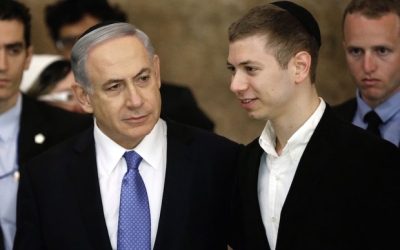Bible Land to Bibi Land: Israel's Netanyahu decade

Once upon a time, Israel was called “the land of the Bible”. Over the past decade, Bible-Land has become “Bibi–Land”.
Looking back at 2009, the year that Netanyahu came to power to stay for the longest premiership in the country’s history, the years that followed have certainly been his decade. Even more so, as he embarks on his fifth run for prime minister, in the third round of polls in just one year, it is clear that Netanyahu has also shaped Israel in his image over this decade.
“He has been a truly transformative leader,” Martin Sherman, founder and CEO of the Israel Institute for Strategic Studies, formerly director of the right-wing “Tzomet” party, told MEE.
Symbolically, both Netanyahu and Israel have reached the turn of the decade with a legal sword of Damocles hanging over their heads: Israel fears a war crimes indictment at the International Criminal Court if the court’s jurisdiction is confirmed; Netanyahu, already indicted on charges of bribery, fraud and breach of trust, faces trial if he fails - for the third time - to form a coalition that will assure his immunity.
People close to Netanyahu say this is not the only reason he desperately seeks victory. They say he honestly believes that he is the chosen one to rule Israel for an unlimited amount of time. So, too, do his followers.
New MEE newsletter: Jerusalem Dispatch
Sign up to get the latest insights and analysis on Israel-Palestine, alongside Turkey Unpacked and other MEE newsletters
In closed meetings with Likud members, he is no longer just “King Bibi”. Some now compare him to Moses, the Biblical leader who led the Hebrews out of bondage in Egypt and met God face to face. A protester confronting a recent anti-Netanyahu demonstration said: “You don’t understand. He is God to us.” He was right.
Deteriorating democracy
This phenomenon is hard to understand, especially to the other part of Israeli society which holds Netanyahu responsible for what Israel has become over these 10 years. The only constant has been the 52-year-old occupation. Other than that, over Bibi’s decade, Israel has become a country of rapid change.
Under his stewardship, it has certainly become much less democratic and more Jewish - not just in the religious sense but rather, the nationalistic sense - shamelessly racist and soaked in hatred for the other and each other.
Netanyahu is obviously not solely responsible for this deterioration. He just encouraged those tendencies, nurtured them by how he acted and by what he said or did not say. He manipulated and weakened the media, offended journalists whom he deemed unfriendly, allowing others to threaten them and wish them dead.
Under Bibi, what was a latent widespread resentment of law enforcement became an outright assault on those institutions. He marked them as dangerous entities, plotting a government coup with himself as their victim, and he convinced many Israelis that they are being kept hostage in the hands of these hostile agencies.

Over this decade, Israel’s ranking has slipped on the corruption index published by Transparency International, now sitting at 34 on the list between Botswana and Poland.
Netanyahu has created a climate where corruption is forgivable and where democracy is often just an obstacle. For him, all opposition is a betrayal and criticism of his conduct perceived merely as a product of a conspiracy.
One of the lowest points of Netanyahu’s years in office is the shameful “nation state” law which enshrined Jewish supremacy, excluded all minorities from the state circle and threw the pretence of “equality” out the window.
Racism thrives. Morality is not a factor. The prime minister enthusiastically called for the pardon of Elor Azaria, a soldier who shot dead a 21-year-old Palestinian who had already been subdued after an attempted stabbing of Israeli soldiers in the Israeli-occupied West Bank city of Hebron. With no moral guidelines, that affair tore Israeli society apart.
It’s no small wonder then, that the decade ends with the far-right disciples of Rabbi Meir Kahane running again in the upcoming March elections. Netanyahu opened the parliament door to them in an attempt to secure the biggest right-wing representation for his future coalition.
Peace as weakness
All of the above can happen under the umbrella of a constant “existential threat” used and abused by Netanyahu, be it Iran, be it Hamas, be it Hezbollah. A nation in fear is easier to handle.
The thousands of missiles shot from Gaza certainly facilitate this mission. In southern Israel, where one-third of the country has been left traumatised and scarred for life, time is measured by before and after “rounds” with Gaza - a euphemism for destruction, loss of life and atrocities.
'Some praise Netanyahu for being cautious on security issues, but in fact, he did nothing to bring us more security'
- Zehava Galon, former Meretz leader
The endless cycle of “rounds” with no visible policy is subject, however, to different interpretations.
“Some praise Netanyahu for being cautious on security issues, but in fact, he did nothing to bring us more security,” Zehava Galon, former head of leftist Meretz party told MEE.
“He just managed the conflict as a strategy for survival and in an attempt to reach any agreement with the Palestinians. Most of his creativity he invested in personal corruption. By now, it is practically impossible to distinguish between his personal interests and the better interests of Israel.”
Sherman, with the Israel Institute for Strategic Studies, looks at Netanyahu from a different perspective.
“While many question his adherence to his professed ideology, he has been at least loosely faithful to his beliefs in the security-foreign policy sphere,” Sherman said.
“He significantly reduced the centrality of the ‘Palestinian problem’. He had remarkable diplomatic success in Africa and South America and fostered warm relations with central and eastern European countries.”
Sherman is right. Netanyahu reduced the "Palestinian problem" not only through his foreign policy, but also with his domestic policy as well. The conflict is off the table, not even on the electoral agenda of Israel’s tiny left. Netanyahu managed to turn “peace” into an obsolete term or at least one that projects weakness. It took him some time, but it worked.
The leader who preached for a “two-state solution” in a Bar-Ilan speech in 2009 is calling, a decade later, for the annexation of the Jordan Valley and the application of Israeli law to the West Bank.
“Everything that does not require international affirmation thrived; the population doubled over the last decade,” said Pinchas Wallerstein, a prominent settler leader for over 40 years. “Still, we want more.”
With friends like these
A review of the new friends whom Netanyahu made for Israel is quite embarrassing. They include Hungarian Prime Minister Viktor Orban, who undermines the democratic process in his own country; Ugandan President Yoweri Museveni, who leads a country where violations of freedom of speech and association continue; and the former president of Guatemala Jimmy Morales, widely criticised for anti-democratic and corrupt conduct - just to name a few.
Israel needs these friends mainly for UN votes, but they bring little honest pride. But that doesn’t matter, their friendship makes many Israelis happy anyway. Netanyahu’s real or imaginary world-leader friends are perceived as friends of every Bibi-loving Israeli. It makes them feel good in an otherwise hostile world.
Netanyahu’s “paranoid tendency” – as his lawyer and close adviser, the late Yaakov Weinroth, once described the PM’s behaviour in a TV interview - plays into the popular Israeli sentiment - “the whole world is against us”. Netanyahu’s friends are our friends. They love him, so they love us.
Ten years in, it is clear that Netanyahu and Israel share the same combination of arrogance and an endless need for love and reinforcement. Some nations want to be feared; Israel wants to be loved. Netanyahu took this to the extreme when he made 40 top Likud candidates pledge loyalty to him in August and sign a petition stating that he was Likud’s only candidate for prime minister, forsaking all others.
Thus the privileged, sophisticated millionaire from a posh Jerusalem neighbourhood has become, over the years, the knight in shining armour of the under-privileged, or those defined as “second Israel” - those at geographic and social peripheries.
Last week’s primaries in his party in which he won a 72.5 percent victory over his opponent proved it. The end of his first decade might soon become the beginning of another. Even if not, it will take time to remodel Bibi-land.
Middle East Eye delivers independent and unrivalled coverage and analysis of the Middle East, North Africa and beyond. To learn more about republishing this content and the associated fees, please fill out this form. More about MEE can be found here.





